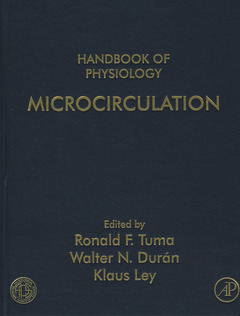Description
Microcirculation (2nd Ed.)
Coordinators: Tuma Ronald F., Duran Walter N., Ley Klaus
Language: English
Subject for Microcirculation:
Publication date: 09-2008
1000 p. · 21.4x27.6 cm · Hardback
1000 p. · 21.4x27.6 cm · Hardback
Description
/li>Contents
/li>Readership
/li>Biography
/li>Comment
/li>
This reference is a volume in the Handbook of Physiology, co-published with The American Physiological Society. Growth in knowledge about the microcirculation has been explosive with the field becoming fragmented into numerous subdisciplines and subspecialties. This volume pulls all of the critical information into one volume.
BLOOD FLOW IN MICROVASCULAR NETWORKS; ENDOTHELIAL CELL BIOLOGY; BIOLOGY OF NITRIC OXIDE SYNTHASE; MICROCIRCULATORY EXCHANGE FUNCTION,REGULATORY MECHANISMS; LYMPHATICS; REGULATION OF PERFUSION; NO-MEDIATED REGULATION; RECEPTOR MEDIATED EVENTs;CONDUCTED VASOMOTOR RESPONSES; ANGIOGENESIS; VASCULOGENESIS; ARTERIOGENESIS AND VASCULAR REMODELING; EXTRACELLULAR MATRIX - CELL ADHESION MOLECULES; INFLAMMATION; LYMPHOCYTE TRAFFICKING; MICROCIRCULATORY SPECIALIZATION IN INDIVIDUAL ORGANS; BRAIN; MYOCARDIUM; KIDNEY; GASTROINTESTINAL/LIVER; LUNG; EYE; AGING ASOCIATED CHANGES; SICKLE CELL DISEASE; HYPERTENSION; DIABETES
Biochemists, Cell and Molecular Biologists, Physiologists, Cardiologists, Rheumatologists, Neurologists, Stroke Researchers, Eye Researchers, Pathologists, Oncologists, and Vasular Biologists
Temple University School of Medicine
Dept. of Physiology
3400 North Broad Street
Philadelphia, PA 19140
Walter N. Duran, PhD
Dept. of Pharmacology & Physiology,University of Medicine & Dentistry, New Jersey Medical School, Medical Science Building, 185 South Orange Ave.
Neward, NJ 07103-2714
- Meticulously edited and reviewed. Benefit: Provides investigators a unique tool to explore the significance of their findings in the context of other aspects of the microcirculation. In this way, the updated edition has a direct role in helping to develop new pathways of research and scholarship
- Highlights the explosive growth in knowledge about the microcirculation including the biology of nitric oxide synthase (NOS), endothelial cell signaling, angiogenesis, cell adhesion molecules, lymphocyte trafficking, ion channels and receptors, and propagated vasomotor responses. Benefit: Microcirculatory biology has become fragmented into numerous sub-disciplines and subspecialties, and these reference reintegrates the information in one volume
© 2024 LAVOISIER S.A.S.



